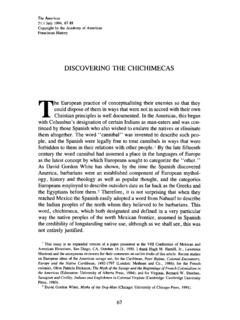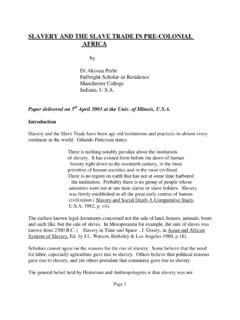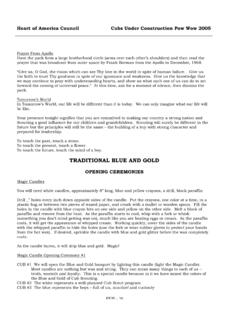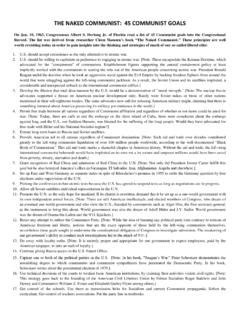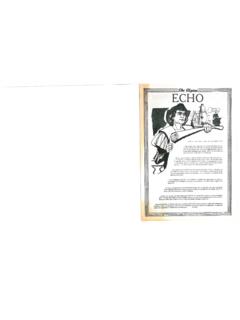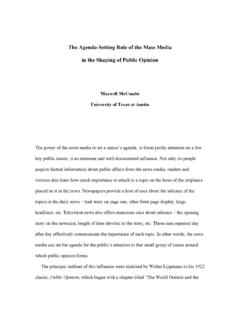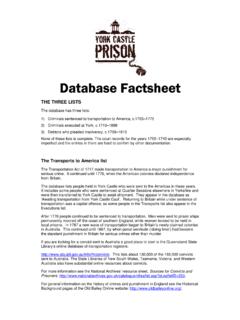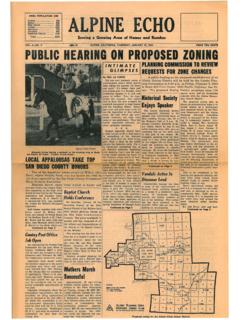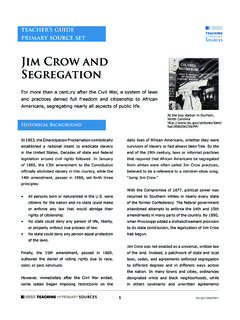Transcription of Slave Names in Colonial South Carolina
1 Slave Names IN Colonial South Carolina HENNIG COHEN University of South Carolina AN INADEQUATE use by scholars and compilers of dictionaries of at least one Colonial newspaper , the South Carolina Gazette published at Charles- ton from 1732 to 1775, has left relatively untouched an important source of Southern contributions to American English. It is quite probable that a more careful examination of the Gazette would yield a number of citations of Ameri- canisms earlier than have been noted previously and perhaps would establish the American origin of a limited number of vocabulary items as well. This would be true, of course, of almost any Colonial newspaper of a comparable period and state of preservation which has not been examined thoroughly; the unique opportunity presented by the Gazette lies in the materials it con- tains concerning the vocabulary associated with the Slave system, concerning African influences on the Gullah dialect of the sea island, and concerning patterns in the nomenclature of slaves.
2 An example of an earlier unrecorded usage from the Gazette is the word driver in the sense of a Negro Slave appointed to the position of overseer. The earliest citation of this word in the NED is dated 1796, and the earliest DAE citation is 1772. The first citation in the DA is from James Grainger's Sugar-Cane, a didactic poem on the cultivation of sugar cane in the British West Indies, written at St. Kitts in the Leeward Islands and published in London in 1764. Driver in the sense of a Negro overseer, was used in the South Carolina Gazette of May io, 1760. Another example, both an earlier usage and an Africanism, is the word Gullah signifying the Negroes of coastal South Carolina and their dialect.
3 For their definition and etymology of Gullah the NED, DAE, and DA rely upon a monograph by Reed Smith published in 1926,1 and the first instance of its use which they cite is a reference found by Smith in an official publication relating to the Denmark Vesey Slave up- rising of 1822. This reference mentions the part played in the insurrection by '"Gullah Jack" and his company of "Gullah or Angola Negroes."'2 A similar reference to Gullah occurs in an advertisement in the Gazette of May 12, 1739, for a runaway Slave described as 'a short well set Negro, named I. 'Gullah,' Bulletin of the University of South Carolina , 1926, pp. 8-9. 2. Probably from An Account of the Late Intended Insurrection among a Portion of the Blacks of This City; Published by the Authority of the Corporation of Charleston (Charleston, , 1822).
4 Slave Names 0o3 Golla Harry.' Actually, Negroes were seldom mentioned by name in Colonial newspapers except in notices concerning runaway slaves, and it is in the Names contained in such notices that African linguistic influences and nominal pat- terns generally are most apparent. Slavery was coexistent with the founding in 1670 of the first permanent colony in South Carolina , and early official records occasionally contain the Names of An inventory of the estate of Francis Jones in 1693 lists 'a negro man Jack' and 'a negro Woman name Jugg.'4 An inventory of the estate of James Beamor in 1694 includes the male slaves Robin, Tony, and Mingo, and the females Rosa, Hannay, Doll, and Betty; an inventory of the estate of Joseph Pendarvis in the same year lists the males Mingo and Tom and the females Bess, Pegg, and Of these Names two, Jugg and Mingo, are probably of African provenience.
5 By 1732, when the Gazette was estab- lished, the appearance of Negro slaves in legal inventories was common. Examples of probable African Names of this period include Bowbaw, Cuffee, Ebo Jo, Ganda, Quaquo, Quomenor, and Quoy for male slaves, and Auba, Bucko, J]uba, Mimba, Odah, and Otta for female An examination of slaves' Names appearing in the Gazette supplements the findings of Lorenzo Turner regarding the presence of a dual naming system among present-day Gullah This system consists of an English or 'true name ' and a more intimate but more widely used nickname, often of African origin. Turner expresses surprise that earlier writers on Gullah failed to note the existence of this system or the importance of African survivals in the nomenclature of the Gullahs.
6 For field investigators this was a remarkable oversight, but it is even more remarkable in the face of evidence found in the Gazette of the tacit recognition by white owners of a dual naming system among Negro slaves in the eighteenth century. As a matter of convenience, owners usually gave their slaves simple Names , but they were aware that the slaves themselves often retained or took an African name . Therefore, in ad- vertising for runaways the owners were at pains to include both the 'proper' name (the name which the owner had prescribed) and the 'country name ' (the African name which the runaway retained). The following examples from advertisements for runaways are evidence of this situation: John Aug.
7 27, 1757 ('.. he will more readily answer to the name of FOOTBEA, which he went by in his own country.') 3. Elizabeth Donnan, ed., Documents Illustrative of the History of the Slave Trade to America (Washington, D. C., I935), IV, 240-43. 4. Will Book 1692-1693, of the Charleston, , Probate Court. 5. Ibid. 6. Inventories 1732-1736, of the Charleston, , Probate Court. 7. Lorenzo Turner, Africanisms in the Gullah Dialect (Chicago, 1949). 104 AMERICAN SPEECH Tyra Aug. ro, 1765 ('The wench's country name ') Somerset Sept. 20, 1773 ('.. his country name ') Limus Sept. 20, 1773 ('.. his Country name .') Mask Sept. 2o, 1773 ('.. his Country name Mussu.)
8 ') Chloe Sept. 27, 1773 ('.. Her Country name , Agua') In certain instances slaves did not receive a 'proper' name but were known by their African Names alone, some of which, like Sambo, Quash, Mingo, and Juba, became commonplace in the eighteenth century. In other instances, slaves translated their African Names into English or used English Names which conformed to the African naming A striking illustration of this practice can be seen in the custom of naming a child for the day, month, or season when he was born. As early as 1774 Edward Long noted that Jamaican Negroes 'called their children by the African day of the week on which they are born,' and he compiled the following chart illustrating this system: Male Female Day Cudjoe Juba Monday Cubbenah Beneba Tuesday Quaco Cuba Wednesday Quao Abba Thursday Cuffee Phibba Friday Quamin Mimba Saturday Quashee Quasheba Sunday Cufee and Cudjo were perhaps the most widely used of the male 'day' Names , and Abba and Juba of the female.
9 An English counterpart of this system of nomenclature existed side by side with the African. Two male slaves named Friday, one of them 'this country born' and the other from the 'Angola Country,' and two male slaves named Monday, one from 'Bom- borough' and the other 'A Barbian Negro' are mentioned in the Gazette. Slaves were more often named for the months of the year, and Gazette notices include the mention of males named January, March, April, May, June, July, August, September, and November. Male Slave Names derived from the seasons are Spring, 'Ebo or Calabar,' and Winter, 'country born.' Moon and Thunder are Names probably connected with the state of the weather at the time of the child's birth.
10 Other male Names which are probably English equivalents of Africanisms are Arrow ('of the Pappa country'), Boy ('Guiney'), Huntsman ('new'), Little One ('Ebo'), Plenty ('Gambia' and 'Mandingo'), and Sharper ('Bambara'). 8. See Turner, op. cit., pp. 31-41. 9. History of Jamaica (London, 1774), P. 427. Long's observations were confirmed by Philip Henry Gosse in A Naturalist's Sojourn in Jamaica (London, 1851 ), pp. 232-33, who obtained his information from 'an old coloured lady,' and by James Platt in 'Christian Names Derived from Week-days,' Notes & Queries, VIII (Nov. I6, 1895), 388-89, whose source was 'a Fantee gentleman (a native of Whydah).

